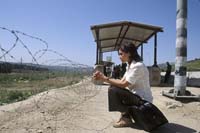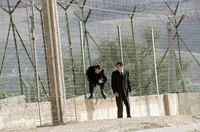Paradise Now, a Golden Global Award winner for Best Foreign Language Film, is an outstanding motion picture presenting the dilemmas faced by Palestinians who wish to liberate their people and establish a Palestinian state. It is a must-see movie, whether you support or object to suicide bombing as a method to promote the Palestinian cause.
The director of “Paradise Now” presents three days in the lives of Said and Khaled, young Palestinians from Nablus, who volunteer to carry out a suicide bombing mission. The Israeli military occupation affects their lives every day. This includes humiliation at checkpoints, military raids on their city, lack of access to education, and limited economic opportunities. Seeing no positive future, Khaled and Said feel obligated to resist and die for the Palestinian cause.
On the way to carry out the mission with explosives attached to their bodies, Said and Khaled go through an emotional and psychological journey that challenges their belief system, way of life, and political views. However, the director of the film provides no easy answers to the Palestinians’ dilemmas or to the question of the morality and effectiveness of suicide attacks.
In the film, Said and Khaled touch on the question of alternative methods to terrorist attacks that can be effective in achieving the Palestinian cause. However, the main alternative to terrorist acts — nonviolent struggle — is never mentioned in the film. Suha, a female Palestinian human rights worker, represents the segment of Palestinians who oppose suicide attacks. Suha believes that suicide bombers do not promote Palestinian liberation, and that on the contrary, they provide Israel with the legitimacy to continue the occupation and win international public support. But will Suha be able to convince Said and Khaled to reconsider carrying out their mission?
In 1987, the Palestinians carried out an almost entirely nonviolent Intifada (or “shaking off”), achieving more concrete accomplishments than the Al Aqsa Intifada. Nonviolence enabled the Palestinians to prove beyond doubt that they have been the victims and that Israel is an oppressive force. Suicide attacks and terrorist organizations reversed this achievement. Nonviolence, as used by many liberation movements, is a greater and stronger force than the Israeli army or any other army for that matter. Additionally, nonviolence works in the long-term, which is never the case with violence. Gandhi once wrote, “I object to violence because when it appears to do good, the good is only temporary; the evil it does is permanent.” The achievements of nonviolence are positive and promote no additional pain and suffering that give birth to more violence. In the past, nonviolent followers achieved freedom and rights in their struggles… to name a few, Gandhi’s Indian movement, the Anti-Apartheid Movement in South Africa, the American Civil Rights Movement, and the Serbian “Otpor” Resistance that overthew Slobodan Miloševic. Within the past few years Palestinians have begun nonviolent resistance to Israel’s wall/barrier that confiscates Palestinian farmland, covered in the Winter 2006 and Summer 2006 issues of PeacePower.
The description of the film ends, “Paradise Now lays bare the humanity and the horror for all to see, to ponder…and perhaps to change.” May this change be toward nonviolent resistance and a nonviolent and peaceful future.
Paradise Now: http://www.imdb.com/title/tt0445620/ and http://wip.warnerbros.com/paradisenow/
“Bridging Conflict Resolution and Human Rights: Lessons from Israel/Palestine” by Mohammed Abu-Nimer and Edy Kaufman in: Human Rights and Conflict Resolution. (Eds.) Julie Mertus and Jeff Helsing (Eds.) Washington DC: USIP April 2006


